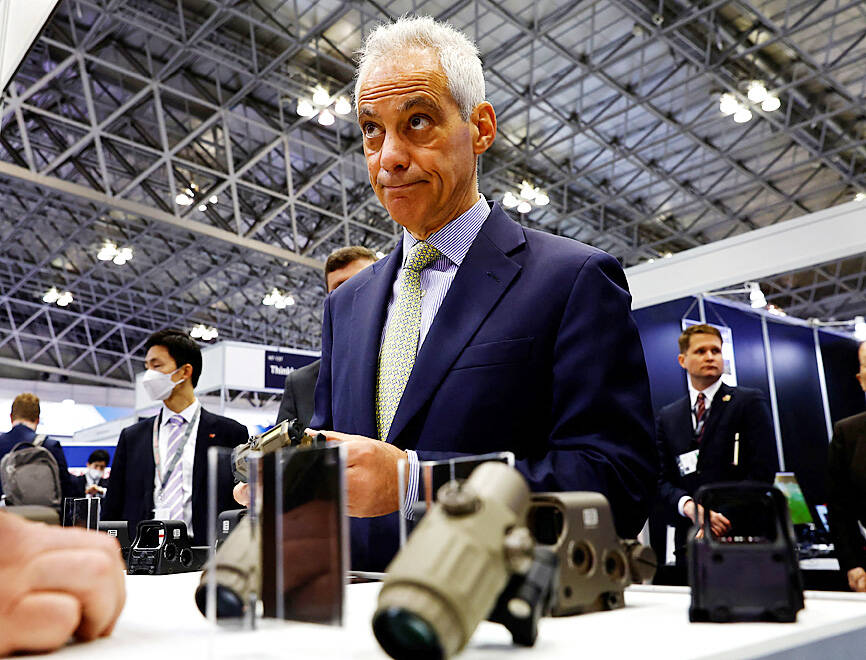The US is pressing the need for allies to coordinate against economic coercion, not just military threats, as Japan prepares to host top diplomats from the G7 nations amid heightened tensions with China.
“That coercion piece is important,” US Ambassador to Japan Rahm Emanuel said in an interview days before the ministerial meeting begins in the mountain resort of Karuizawa tomorrow. “It keeps the United States in the center of gravity, and helps our allies and alliance and our friends to know that we are in the game.”
China is set to be a key focus of discussions at the meeting, which is to lay the groundwork for a leaders’ summit in Hiroshima next month.

Photo: Reuters
Japanese Prime Minister Fumio Kishida has invited a raft of guest leaders from Asia and beyond, including from South Africa and South Korea.
One person who was not invited was Chinese President Xi Jinping (習近平), who has been on a diplomatic charm offensive of late in a bid to push for peace in Ukraine and attract more foreign investment to the world’s second-biggest economy following isolation due to COVID-19 restrictions.
Japan has put an emphasis on economic coercion and is aiming for outcomes by the leaders’ summit, people familiar with the deliberations said.
Meanwhile, US Representative Michael McCaul, who chairs the US House of Representatives Foreign Affairs Committee, has blasted Beijing for what he sees as an unjust pressure campaign.
“Coercion is core to China’s economic model,” McCaul said during a visit to Asia this month.
Xi last week hosted French President Emmanuel Macron, who was forced to defend comments to the media that Europe should not simply follow the US over Taiwan.
Brazilian President Luiz Inacio Lula da Silva, who was to meet Xi in Beijing yesterday, this week called on BRICS nations to come up with an alternative to the US dollar in foreign trade.
The G7 is to look to refocus the discussion on Chinese economic coercion.
Trade ministers said in a statement earlier this month that they would seek ways to work together to counter coercion that “undermines economic security.”
While that statement did not mention China, it follows a campaign by the administration of US President Joe Biden to corral support from allies in reducing dependence on Beijing for key elements in supply chains, such as semiconductors.
Japan last month became the latest to announce restrictions on exports of some of its most advanced chip technology, following similar moves by the US and the Netherlands.
Emanuel said that China’s strategy on coercion was “part of a defense build-up” and not “some aberration.”
In an analysis on the topic distributed to media, he said that a long list of countries including Japan, the Philippines, South Korea and Australia had encountered coercion from China in the recent past.
The G7 and the US-led Indo-Pacific Economic Framework for Prosperity are potential forums for formalizing rules on how to deal with the issue, Emanuel said in the interview.

The US dollar was trading at NT$29.7 at 10am today on the Taipei Foreign Exchange, as the New Taiwan dollar gained NT$1.364 from the previous close last week. The NT dollar continued to rise today, after surging 3.07 percent on Friday. After opening at NT$30.91, the NT dollar gained more than NT$1 in just 15 minutes, briefly passing the NT$30 mark. Before the US Department of the Treasury's semi-annual currency report came out, expectations that the NT dollar would keep rising were already building. The NT dollar on Friday closed at NT$31.064, up by NT$0.953 — a 3.07 percent single-day gain. Today,

‘SHORT TERM’: The local currency would likely remain strong in the near term, driven by anticipated US trade pressure, capital inflows and expectations of a US Fed rate cut The US dollar is expected to fall below NT$30 in the near term, as traders anticipate increased pressure from Washington for Taiwan to allow the New Taiwan dollar to appreciate, Cathay United Bank (國泰世華銀行) chief economist Lin Chi-chao (林啟超) said. Following a sharp drop in the greenback against the NT dollar on Friday, Lin told the Central News Agency that the local currency is likely to remain strong in the short term, driven in part by market psychology surrounding anticipated US policy pressure. On Friday, the US dollar fell NT$0.953, or 3.07 percent, closing at NT$31.064 — its lowest level since Jan.

The New Taiwan dollar and Taiwanese stocks surged on signs that trade tensions between the world’s top two economies might start easing and as US tech earnings boosted the outlook of the nation’s semiconductor exports. The NT dollar strengthened as much as 3.8 percent versus the US dollar to 30.815, the biggest intraday gain since January 2011, closing at NT$31.064. The benchmark TAIEX jumped 2.73 percent to outperform the region’s equity gauges. Outlook for global trade improved after China said it is assessing possible trade talks with the US, providing a boost for the nation’s currency and shares. As the NT dollar

The Financial Supervisory Commission (FSC) yesterday met with some of the nation’s largest insurance companies as a skyrocketing New Taiwan dollar piles pressure on their hundreds of billions of dollars in US bond investments. The commission has asked some life insurance firms, among the biggest Asian holders of US debt, to discuss how the rapidly strengthening NT dollar has impacted their operations, people familiar with the matter said. The meeting took place as the NT dollar jumped as much as 5 percent yesterday, its biggest intraday gain in more than three decades. The local currency surged as exporters rushed to